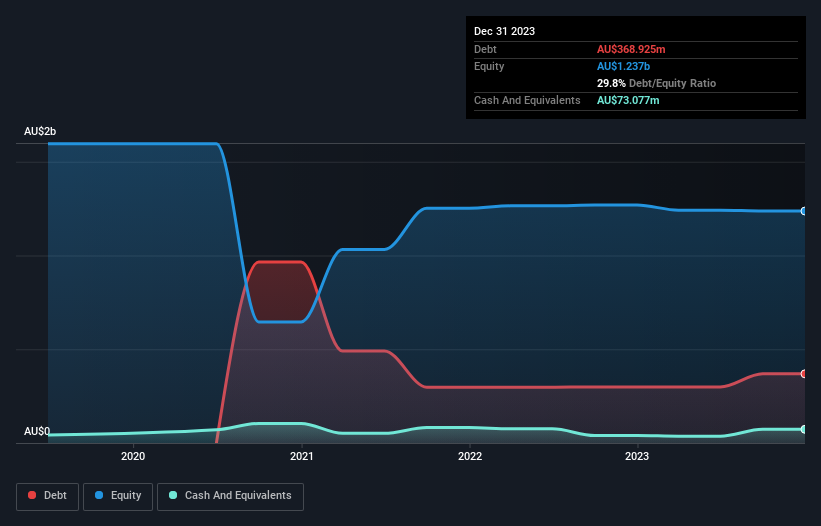- Australia
- /
- Real Estate
- /
- ASX:PXA
These 4 Measures Indicate That PEXA Group (ASX:PXA) Is Using Debt Extensively
David Iben put it well when he said, 'Volatility is not a risk we care about. What we care about is avoiding the permanent loss of capital.' So it seems the smart money knows that debt - which is usually involved in bankruptcies - is a very important factor, when you assess how risky a company is. We can see that PEXA Group Limited (ASX:PXA) does use debt in its business. But the more important question is: how much risk is that debt creating?
When Is Debt A Problem?
Debt assists a business until the business has trouble paying it off, either with new capital or with free cash flow. In the worst case scenario, a company can go bankrupt if it cannot pay its creditors. However, a more usual (but still expensive) situation is where a company must dilute shareholders at a cheap share price simply to get debt under control. Having said that, the most common situation is where a company manages its debt reasonably well - and to its own advantage. The first thing to do when considering how much debt a business uses is to look at its cash and debt together.
See our latest analysis for PEXA Group
What Is PEXA Group's Debt?
You can click the graphic below for the historical numbers, but it shows that as of December 2023 PEXA Group had AU$368.9m of debt, an increase on AU$298.4m, over one year. On the flip side, it has AU$73.1m in cash leading to net debt of about AU$295.8m.

How Healthy Is PEXA Group's Balance Sheet?
The latest balance sheet data shows that PEXA Group had liabilities of AU$65.0m due within a year, and liabilities of AU$448.8m falling due after that. Offsetting these obligations, it had cash of AU$73.1m as well as receivables valued at AU$8.16m due within 12 months. So it has liabilities totalling AU$432.6m more than its cash and near-term receivables, combined.
Given PEXA Group has a market capitalization of AU$2.17b, it's hard to believe these liabilities pose much threat. However, we do think it is worth keeping an eye on its balance sheet strength, as it may change over time.
We measure a company's debt load relative to its earnings power by looking at its net debt divided by its earnings before interest, tax, depreciation, and amortization (EBITDA) and by calculating how easily its earnings before interest and tax (EBIT) cover its interest expense (interest cover). The advantage of this approach is that we take into account both the absolute quantum of debt (with net debt to EBITDA) and the actual interest expenses associated with that debt (with its interest cover ratio).
Weak interest cover of 1.6 times and a disturbingly high net debt to EBITDA ratio of 9.1 hit our confidence in PEXA Group like a one-two punch to the gut. This means we'd consider it to have a heavy debt load. Worse, PEXA Group's EBIT was down 93% over the last year. If earnings keep going like that over the long term, it has a snowball's chance in hell of paying off that debt. The balance sheet is clearly the area to focus on when you are analysing debt. But it is future earnings, more than anything, that will determine PEXA Group's ability to maintain a healthy balance sheet going forward. So if you're focused on the future you can check out this free report showing analyst profit forecasts.
But our final consideration is also important, because a company cannot pay debt with paper profits; it needs cold hard cash. So it's worth checking how much of that EBIT is backed by free cash flow. Over the last three years, PEXA Group actually produced more free cash flow than EBIT. That sort of strong cash generation warms our hearts like a puppy in a bumblebee suit.
Our View
PEXA Group's EBIT growth rate and net debt to EBITDA definitely weigh on it, in our esteem. But the good news is it seems to be able to convert EBIT to free cash flow with ease. Taking the abovementioned factors together we do think PEXA Group's debt poses some risks to the business. While that debt can boost returns, we think the company has enough leverage now. In light of our reservations about the company's balance sheet, it seems sensible to check if insiders have been selling shares recently.
If, after all that, you're more interested in a fast growing company with a rock-solid balance sheet, then check out our list of net cash growth stocks without delay.
New: Manage All Your Stock Portfolios in One Place
We've created the ultimate portfolio companion for stock investors, and it's free.
• Connect an unlimited number of Portfolios and see your total in one currency
• Be alerted to new Warning Signs or Risks via email or mobile
• Track the Fair Value of your stocks
Have feedback on this article? Concerned about the content? Get in touch with us directly. Alternatively, email editorial-team (at) simplywallst.com.
This article by Simply Wall St is general in nature. We provide commentary based on historical data and analyst forecasts only using an unbiased methodology and our articles are not intended to be financial advice. It does not constitute a recommendation to buy or sell any stock, and does not take account of your objectives, or your financial situation. We aim to bring you long-term focused analysis driven by fundamental data. Note that our analysis may not factor in the latest price-sensitive company announcements or qualitative material. Simply Wall St has no position in any stocks mentioned.
About ASX:PXA
PEXA Group
Operates a digital property settlements platform in Australia.
Reasonable growth potential with adequate balance sheet.
Market Insights
Community Narratives



